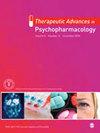对 COVID-19 大流行期间一线医护人员的创伤后应激反应、抑郁和焦虑症状之间的共存关系进行网络分析
IF 3.4
3区 医学
Q2 PHARMACOLOGY & PHARMACY
引用次数: 0
摘要
背景:2019年冠状病毒病大流行指出一线医护人员(HCWs)有明显的精神症状。目的:我们旨在估计大流行期间芳村收容所医院医护人员创伤后应激症状(PTSS)、抑郁和焦虑症状的患病率和合并症。设计:2022年4月,通过分层随机抽样设计在线获取人口统计学信息、DSM-5创伤后应激障碍核对表(PCL-5)、患者健康问卷(PHQ-9)和广泛性焦虑症问卷(GAD-7),共获得284份符合条件的回复。方法:应用层次回归分析研究与心理状态结果(PHQ-9、GAD-7和PCL-5)相关的自变量,并应用网络分析探讨PCL-5、PHQ-9和GAD-7所有项目的合并症。53名(18.66%)医护人员至少有一种精神障碍,其中26.42%-37.74%的医护人员合并有两种或三种精神障碍;(2)发现了几个影响精神健康的因素,包括医疗专业、工作时间、接触的病人(P <0.05);(3)PTSS和抑郁症之间突出的桥接症状是睡眠问题、自杀意念、注意力不集中和鲁莽。PTSS 与焦虑的共病被认为主要源于负面情绪,如害怕、焦虑、烦恼和担忧。结论:我们的数据表明,在流感大流行期间,高危人群中存在轻度的创伤后应激障碍、抑郁和焦虑症状,这可能为评估和干预合并症提供了新的见解。本文章由计算机程序翻译,如有差异,请以英文原文为准。
Network analysis of the comorbidity between post-traumatic stress, depression and anxiety symptoms among frontline healthcare workers during the COVID-19 pandemic
Background:Coronavirus disease 2019 pandemic pointed out significant mental symptoms of frontline healthcare workers (HCWs).Objective:We aimed to estimate the prevalence and comorbidity of post-traumatic stress symptoms (PTSS), depression and anxiety symptoms in HCWs from Fangcang shelter hospitals during the pandemic.Design:Demographic information, post-traumatic stress disorder checklist for DSM-5 (PCL-5), Patient Health Questionnaire (PHQ-9) and Generalized Anxiety Disorder Questionnaire (GAD-7) were obtained online based on stratified random sampling design during April 2022, with 284 eligible responses.Method:Hierarchical regression analyses were applied to investigate independent variables associated with psychological status outcomes (PHQ-9, GAD-7 and PCL-5), and the network analyses were applied to explore the comorbidity using all items of PCL-5, PHQ-9 and GAD-7.Results:(1) 10.56%, 13.03% and 8.10% of HCWs reported PTSS, depression and anxiety symptoms. Fifty-three (18.66%) HCWs experienced at least one mental health disorder, among which 26.42–37.74% HCWs had comorbidity of two or three mental disorders; (2) several influence factors of mental health were identified, including medical professions, working hours, contacted patients ( p < 0.05); (3) prominent bridge symptoms between PTSS and depression were sleep problems, suicide ideation, concentration difficulties and recklessness. Comorbidity between PTSS and anxiety was thought to mainly stem from negative affect, such as afraid, anxious, annoyed and worrying. Depressed mood and worry might be good targets during treatment of comorbidity of depression and anxiety.Conclusion:Our data suggest mild level of PTSS, depression and anxiety symptoms among HCWs during the pandemic and might give novel insights into assessment and intervention of comorbidity.
求助全文
通过发布文献求助,成功后即可免费获取论文全文。
去求助
来源期刊
CiteScore
7.90
自引率
2.40%
发文量
35
审稿时长
10 weeks
期刊介绍:
Therapeutic Advances in Psychopharmacology delivers the highest quality peer-reviewed articles, reviews, and scholarly comment on pioneering efforts and innovative studies across all areas of psychopharmacology. The journal has a strong clinical and pharmacological focus and is aimed at clinicians and researchers in psychopharmacology, providing a forum in print and online for publishing the highest quality articles in this area.

 求助内容:
求助内容: 应助结果提醒方式:
应助结果提醒方式:


